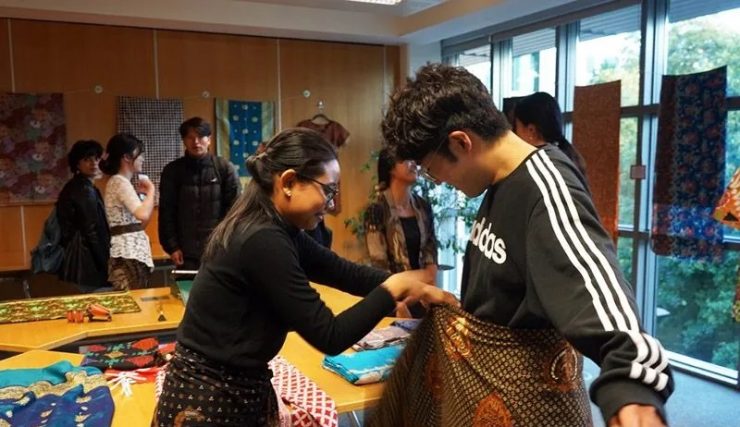INDONESIAN culture is promoted in various parts of the world by students receiving the Indonesian International Student Mobility Awards (IISMA) scholarship, a flagship program from the Ministry of Education, Culture, Research and Technology.
The scholarship recipients are undergraduate level students who can take part in the learning process at world-leading campuses for one semester. There, they held the BATIK Challenge, which is a non-academic activity aimed at promoting Indonesian culture.
This Batik Challenge activity is a manifestation of Plt. The Director General of Higher Education, Research and Technology, Nizam, when sending off the IISMA awardees last September.
“Young brothers and sisters are truly representatives of Indonesia to inform about our country to the international community, in addition to studying abroad, gaining experience and building global friendship. This is a very good opportunity to get to know the world,” said Nizam as written in an official statement, Wednesday.
In the European Region, IISMA scholarship recipients who study at the University of Pecs, for example, hold activities for children at Elementytar, a daycare for children aged 4-14 years in the city of Pecs, Hungary.
They invited the children to draw batik patterns and color them, introduced Indonesian traditional games such as marble running and also a donut eating contest as a modification of the cracker eating contest.
In America, IISMA scholarship recipients at UC Chile held a series of activities that contributed to the environment, animals and Indonesian culture. They cleaned the campus environment, gave food to animals that live on the streets of Santiago, and performed gamelan performances at the Museo del Sonido with the Indonesian Embassy in Santiago. This series of activities is entitled Memayu Hayuning Sesama, Memayu Hayuning Bawana which means sharing goodness for fellow human beings, and sharing goodness for the world.
In Australia, recipients of an IISMA scholarship at Monash University opened a booth offering a variety of native Indonesian coffees, including coffee from Aceh, Lampung, Toraja, and other coffee-producing areas. Through a cup of coffee, they provide an experience of taste and aroma, and open conversations about Indonesia. They also invited booth visitors to donate to the Literacy for Life Foundation, an organization that works on indigenous people’s literacy.
In the UK and Ireland, awardees at University College Cork held activities which included an exhibition of Indonesian traditional fabrics accompanied by informative information. Participants in the event also got hands-on experience using Indonesian traditional fabrics and even learned the process of making Batik with a carving workshop.
In the Asian region, the awardees at Chulalongkorn University took part in an Indonesian traditional cloth dress show and a painting workshop with a number of native Indonesian painting artists, in collaboration with the Indonesian Embassy in Bangkok
Not only on the four campuses above, the BATIK Challenge was attended by 1155 IISMA awardees at 72 world-class universities in 26 countries in Europe, America, Australia and Asia collectively at each host university. During the activity, of course the awardees used Batik and other Indonesian traditional fabrics to introduce the diversity of Indonesian culture to various parts of the world.
With this BATIK Challenge, it is hoped that IISMA, which is one of the Free Learning – Independent Campus (MBKM) policy programs launched by the Indonesian Minister of Education and Culture, Nadiem Makarim, can achieve its goal of preparing students to become graduates who are strong, relevant to the needs of the times, and ready Become a leader by upholding a high national spirit.
The Head of the IISMA Program, Rachmat Sriwijaya, said that, apart from introducing Indonesian culture at the global level, the BATIK Challenge activity is also an actualization space for IISMA awardees to practice collaboration skills and also contribute positively to the communities around them and to the country. [antaranews/photo special]
















